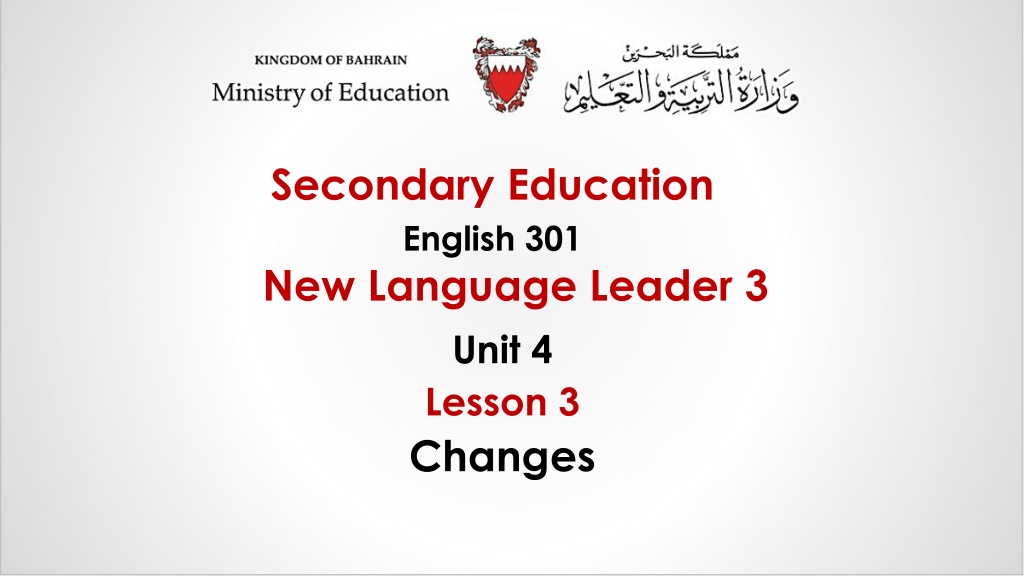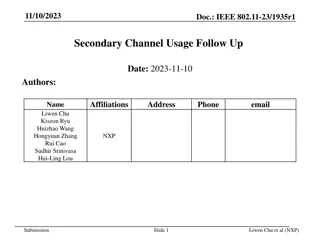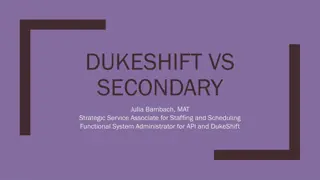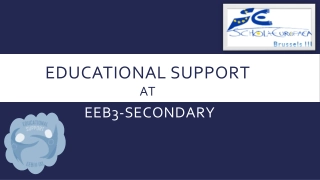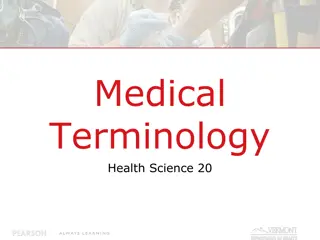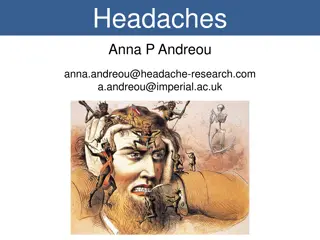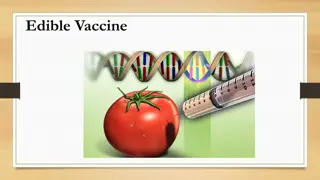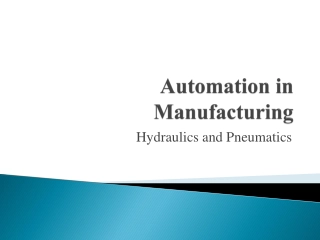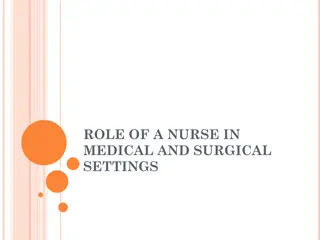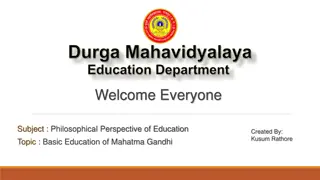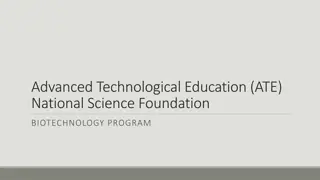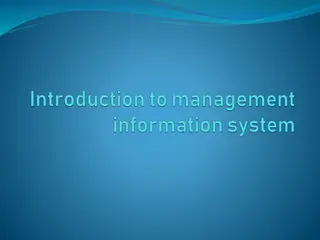Advantages and Disadvantages of Medical Technology in Secondary Education
Explore the benefits and risks of medical technology in a secondary education setting. Learn about the advancements in healthcare, including personalized medicine and wearable technology, while understanding the potential drawbacks such as increased treatment costs and risks of wrong diagnosis. Enhance your language skills by identifying specific information in the reading text and practicing verb usage in the future perfect and future simple tenses.
Download Presentation
Please find below an Image/Link to download the presentation.
The content on the website is provided AS IS for your information and personal use only. It may not be sold, licensed, or shared on other websites without obtaining consent from the author. Download presentation by click this link. If you encounter any issues during the download, it is possible that the publisher has removed the file from their server.
Presentation Transcript
Secondary Education English 301 New Language Leader 3 Unit 4 Lesson 3 Changes
Eng. 301 Unit 4 Lesson 3 Changes OBJECTIVES: By the end of the lesson, you will be able to: extract specific information and language items from a reading text. revise and extend your range of verbs and dependent prepositions. revise and learn about the future perfect simple and the future simple, and practise using them.
What are the advantages and disadvantages of medical technology? Medical Technology provides benefits, but it also brings significant risks. Classify the statements in the box under the right headings. 1. time-consuming in recovery in the event of faults and errors Advantages Disadvantages time-consuming in recovery in the event of faults and errors 2. increased cost of the treatment for the patients electronic health records of patients in hospitals 3. electronic health records of patients in hospitals increased cost of the treatment for the patients exposure dangers from radiation therapy and CT communication systems in healthcare hospitals information is more secure 4. exposure dangers from radiation therapy and CT 5. communication systems in healthcare hospitals 6. show wrong result of the patients condition 7. information is more secure technology improving healthcare in hospitals show wrong result of the patients condition 8. damaging cells and organs of the body of the patients can allow care and access to specialists across long distances. damaging cells and organs of the body of the patients 9. technology improving healthcare in hospitals 10. can allow care and access to specialists across long distances. Eng. 301 Unit 4 lesson 3 Changes
Write down the following questions before moving to the reading passage on the following slide. A. Find a noun in the FIRST PARAGRAPH that means the average period that a person may expect to live . _______________________________________________________________________________________________________ B. According to the text, what is meant by personalised medicine ? . C. In context, the abbreviation MRI ( paragraph 2) stands for: (circle the best option) 1. Monetary Research Institute 2. Method Replacement Indicator 3. Magnetic Resonance Imagining D. Match the underlined words in the passage with their corresponding definitions. Note that there is one EXTRA definition. electroencephalogram surgical transplant wearable technology monitoring Definitions Words 1. to transfer (an organ or tissue) from one part or individual to another 2. devices that can be worn by a consumer and often include tracking information related to health and fitness 3. a test that detects electrical activity in your brain using small, metal discs (electrodes) attached to your scalp 4. relating to the process of performing a medical operation Eng. 301 Unit 4 lesson 3 Changes
Now read the passage below and answer the questions that you covered on the previous slide. 1 In 1909, the average of human life expectancy was thirty-three years. A century later, it reached sixty-seven, with a progression of three years since 1999. Main reason: the fantastic progress of medicine. 2 The discoveries made over the past century, which are more the work of physicists, chemists and even computer scientists, have transformed the science of diagnostics (electroencephalogram, scanner, MRI, etc.), paving the way for new surgical procedures (transplants, poses implants such as the pacemaker, bone or ceramic teeth ...) etc. All of this progress is accelerating. Today, gene therapies give hope for one day to overcome cancer and genetic diseases. But, what about the future? 3 With the growth of wearable technology and remote monitoring, in addition to conventional patient records, there will be greater emphasis on gathering and analysing large amounts of data. This will support more personalised medicine where treatment will be individually tailored to the patient. Patients will still need specialists with expert knowledge, but the patient and specialist don t need to be in the same space at the same time. A network of connected care means several experts can look at the case simultaneously. This would enable the early diagnosis of health issues by constant monitoring before they become more serious. Eng. 301 Unit 4 lesson 3 Changes
Now check your answers A. Find a noun in the FIRST PARAGRAPH that means the average period that a person may expect to live . ____ life expectancy A treatment that is individually tailored to the patient. B. According to the text, what is meant by personalised medicine ? . C. In context, the abbreviation MRI ( paragraph 2) stands for: (circle the best option) 1. Monetary Research Institute 2. Method Replacement Indicator 3. Magnetic Resonance Imagining D. Match the underlined words in the passage with their corresponding definitions. Note that there is one EXTRA definition. electroencephalogram surgical transplant wearable technology monitoring Definitions Words 1. to transfer (an organ or tissue) from one part or individual to another transplant 2. devices that can be worn by a consumer and often include tracking information related to health and fitness wearable technology 3. a test that detects electrical activity in your brain using small, metal discs (electrodes) attached to your scalp electroencephalogram 4. relating to the process of performing a medical operation surgical Eng. 301 Unit 4 lesson 3 Changes
Vocabulary: Dependent Prepositions A dependent preposition is a preposition that always follows the same expression; for example, we say interested in (and NOT X interested on or interested about X). Based on your knowledge, write the prepositions in the box below with their corresponding verbs that they follow. Form: Verb + Preposition from about for in about on with from These are examples of different verbs followed by preposition: on 1. focus 2. succeed in These are some verbs that are followed by the preposition for: 3. suffer from apologise for, apply for. ask for, prepare for, beg for, care for, fight for etc. 4. recover from These are some verbs that are followed by the preposition to: 5. worry about admitted to, belongs to, go to, listen to, travel to, respond to etc. 6. agree with These are some verbs that are followed by the preposition about: 7.protect from 8.care for care about, ask about, forget about, know about, talk about, write about etc. These are some verbs that are followed by the preposition with: agree with, argue with, interfere with, meet with, begin with etc. Eng. 301 Unit 4 lesson 3 Changes
These are some verbs that are followed by the preposition of: consist of, take care of, smell of, die of etc. These are some verbs that are followed by the preposition at: arrive at, laugh at, look at, smile at, stare at etc. These are some verbs that are followed by the preposition on: base on, concentrate on, rely on, agree on, plan on , depend on , focus on, concentrate on etc. These are some verbs that are followed by the preposition from: come from, protect from, save from, suffer from, escape from etc. Dependent prepositions can also come after adjectives, and also after nouns. Form: Noun + Preposition Form: Adjective + Preposition There is no solution to the problem I m interested in photography I like your attitude towards your parents. He s not aware of the seriousness of the problem. other examples: information about, knowledge of, difference between/of, reduction in, result of etc. other examples: anxious about , anxious of, delighted at/about, dissatisfied with etc. Eng. 301 Unit 4 lesson 3 Changes
Practice time 1. What do you _____________Mathematics? know about Fill in the blanks with the words in the box below. (15 minutes) 2. They don t know what you are____________. talking about 3. I totally ____________you. agree with 4. I _____________being rude in front of the customers. apologise for apologise for talking about argue with smile at know about protect from interfere with smells of agree with traveling to don t agree on introduce to applied for talking about succeeded in 5. We _______________anything but we re good friends. don t agree on 6. Steven ______________ earning a scholarship. succeeded in 7. I am ____________Belgium. I love Tomorrowland. traveling to to 8. I am going to ___________ you ___ my friends from school. introduce 9. The police are going to __________ you ______ criminals. protect from 10. I ___________a position in Google but they haven t called me yet. applied for talking about 11. They don t know what you are______________. 12. Don t ___________customers. argue with 13. This shampoo ___________bananas. smells of smile at 14. My daughters always ____________me. 15. Don t ______________the investigation. interfere with Eng. 301 Unit 4 lesson 3 Changes
Add a preposition in each blank. ( for, at, to, about, of, in, on, with, by) . (10 MINUTES) Extra Practice 1. She is interested ______ all types of music. 11. Don't forget to ask ______ a receipt when you leave. for in on to 2. We are almost totally dependent _____ the weather. 12. The bicycle was tied ____ the roof of the car. 3. The film is loosely based ______ the book. 13. Nobody is certain _________ the future. of/about on with 4. The final decision rests ______ the school principal. 14. She was suspicious ______ his motives from the start. of for on 5. She has been doing research _______ cancer for twenty 15. She was blamed ________ the accident. of years. 16. The meal consisted ______ seven courses. for 6. Although he paints, he is most famous ______ his poetry. 17. Some people are allergic ______ nuts. to to 18. I am concerned __________ her poor progress. about/by 7. I could never get accustomed _____ the cold weather. to/with 8. I got so totally absorbed ______ the film, I forgot the cake! in 19. His name is linked ________ the club. 9. The last quarter saw a sudden increase _____ house prices. 20. As you have ten years experience here you must be eligible in 10. He is capable _____ turning the company s fortunes of _____ promotion. for at around. 21. What time did you arrive _____ the hotel? for 22. He has a reputation _______ arriving early. Eng. 301 Unit 4 lesson 3 Changes
The Simple future Perfect and the Simple Future The simple future is used: To predict a future event: e.g. It will rain tomorrow. To express willingness: e.g. I'll do the washing-up. We use the simple future for instant decisions. The Future Perfect shows that something will occur before: another action occurs in the future before a specific time in the future. Form: will have + past participle Form:. will / shall + the infinitive without to [root form of verb]. The affirmative form of the simple future: I, you, he, she, it, we, they will / ''ll go. Affirmative Negative Interrogative I will / 'll have finished. I will not / won't have finished. will you have finished? I will have finished my English homework by the time my mother arrives. The interrogative form of the simple future: Will I, you, he, she, it, we, they go? Will you have finished your English homework by the time your mother arrives? The negative form of the simple future: I, you, he, she, it, we, they will not go. won't By the end of this weekend, I will have revised my lessons. Eng. 301 Unit 4 lesson 3 Changes
Choose the correct form of verb in the following sentences: 1. By the time we get there, the store ________ (close). a. will close b. will have closed c. closed 2. I ________ (see) you tomorrow at 3:00 PM. a. will see b. see c. will be seeing 3. After we finish this video, I ________ (see) all of this director's movies. a. will see b. will be seeing c. will have seen 4. She doesn't realize what kind of person he is, but she ________ (find out). a. will find out b. will be finding out c. will have found out 5. She insulted me. I ________ (speak) to her again! a. will never speak b. will never be speaking c. will have never spoken 6. If he continues working so fast, he ________ (submitted) the whole assignment by midnight. a. will submit b. will have submitted c. will be submitting 7. Wake me up by nine o'clock - I ______________________ (sleep) long enough by then. a. will sleep b. will be sleeping c. will have slept Eng. 301 Unit 4 lesson 3 Changes
Complete the following sentences in the simple future perfect tense. will have written 1. I am writing a book. By this time next month, I __________________ ( to write) the book. If he wins another gold medal, he______________(to win) four in his entire career. will have won 2. Dan ________________ (to climb) Mt. Fuji eight times by November 10. will have climbed 3. 4. Peter and Susan ______________(to eat) dinner by the time you get back from work. will have eaten 5. The baseball player_____________ (to hit) six homeruns if he hits another one tonight. will have hit 6. By this time tomorrow, they _______________ (to invite) all their friends for the wedding. will have invited I _______________ (to do) the laundry by noon tomorrow. will have done 7. My brother _________________ (to graduate) from college by next summer. will have graduated 8. 9. I ______________ (to read) ten novels if I finish reading this one tomorrow. will have read 10. I _____________________ (to complete) ten sentences if I am able to complete this one. will have completed Eng. 301 Unit 4 lesson 3 Changes
THIS IS THE END OF THE LESSON THANK YOU FOR YOUR ATTENTION AND HARD WORK Eng. 301 Unit 4 lesson 3 Changes
